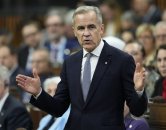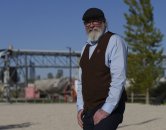Canadians have mixed views on Truth and Reconciliation Day, poll finds
As Canada marks Truth and Reconciliation Day, pollsters have found that while Indigenous reconciliation is becoming increasingly important to Canadians, more than half think there are more important social issues that the country should be focusing on.
The new poll from Leger found that while 69 per cent say they have more understanding of why reconciliation with Indigenous Peoples is important, 54 per cent say they “think there are bigger societal challenges in Canada, and too much attention is being paid to reconciliation matters specifically.” Forty-six per cent of Canadians say they are frustrated by how slowly reconciliation is moving in this country and that they don’t think progress has been made.
“Big picture here is that reconciliation is a long road. Canadians are walking it, but unevenly,” said Jennifer McLeod Macey, senior vice-president with Leger.
Truth and Reconciliation Day, held annually on Sept. 30, is a memorial to those who died — and survived — Canada’s long-running Indian residential school system. Over the past decade, Canada has embarked upon an at-times dramatic reckoning with the legacy of colonialism and the fallout from residential schools, including the final report of the Truth and Reconciliation Commission, released in December 2015, and a controversy over potential unmarked graves discovered at residential schools.
Just 19 per cent of Canadians say that the day is very important, and matters to them personally, while 43 per cent say that while it’s good that Canada marks a dark chapter in its history, it’s not important to them. Almost one-third of poll respondents say they treat Sept. 30 like any other day — a view that’s most popular in Quebec (39 per cent) and least popular in Ontario (25 per cent).
While 44 per cent of Canadians say that governments should be doing more to address reconciliation, it’s nevertheless a low-down-the-list priority when compared to issues such as health care, which 88 per cent of Canadians believe the government needs to do more to address, and the economy, which 86 per cent of Canadians flag as important.
Sixty per cent of those in the 18 to 34 age bracket say more needs to be done on reconciliation, compared to just 36 per cent of those aged 55 and older.
There are also wide regional and demographic differences among those who consider reconciliation to be key priority. Forty-nine per cent of Ontarians say that governments need to do more on reconciliation, compared to just 27 per cent of those in Manitoba and Saskatchewan, for example.
With the polling done this month, and wildfire season in the Prairies drawing to a close, focus on other concerns and priorities could be one factor in why those in Manitoba and Saskatchewan weren’t as concerned about governments making reconciliation a priority.
“That might be more top of mind,” McLeod Macey said.
Yet, many Canadians say that over the past five years, they are more aware of Indigenous history and why reconciliation is important. Sixty-four per cent of poll respondents say they now know more about Indigenous history than they did a half-decade ago and 69 per cent say they are more aware of why reconciliation is important. Twenty-seven per cent say they are much more aware — an 11-point jump since Leger asked the question in 2024.
“Just to bring it back to that bigger picture, while awareness is moving in the right direction, we now need to move beyond awareness and into reconciliation, because awareness alone is not reconciliation,” McLeod Macey said.
Those in Ontario are the most likely (72 per cent) to say they are more understanding of why reconciliation is important, and just 49 per cent of them believe there are other social issues in Canada that need addressing, compared to the 67 per cent of poll respondents from Manitoba and Saskatchewan who believe too much attention is paid to Indigenous reconciliation. Men are far more likely (61 per cent) than women (47 per cent) to say other societal issues require more attention, the polling finds.
A slight majority of Canadians — 53 per cent — said they would do something special to mark Truth and Reconciliation Day on Tuesday. Twenty-three per cent said they would wear orange to show support and 17 per cent said they would actively listen to Indigenous people talk about their issues. Twelve per cent planned to do research about the residential school system and 15 per cent said they would talk to their friends and family about the issue.
“The real test is, can the small acts add up to something bigger?” said McLeod Macey
Quebecers, at 59 per cent, are the most likely to say they won’t do anything special to mark the day, followed by 55 per cent of those in Manitoba and Saskatchewan.
The online poll of 1,528 Canadians was conducted between Sept. 26 and Sept. 29. Results were weighted according to age, gender, mother tongue, region, education and presence of children in the household to form a representative sample of the Canadian population. For comparison purposes, a probability sample of this size would yield a margin of error no greater than plus or minus 2.51 per cent, 19 times out of 20.
Our website is the place for the latest breaking news, exclusive scoops, longreads and provocative commentary. Please bookmark nationalpost.com and sign up for our daily newsletter, Posted, here.



Comments
Be the first to comment